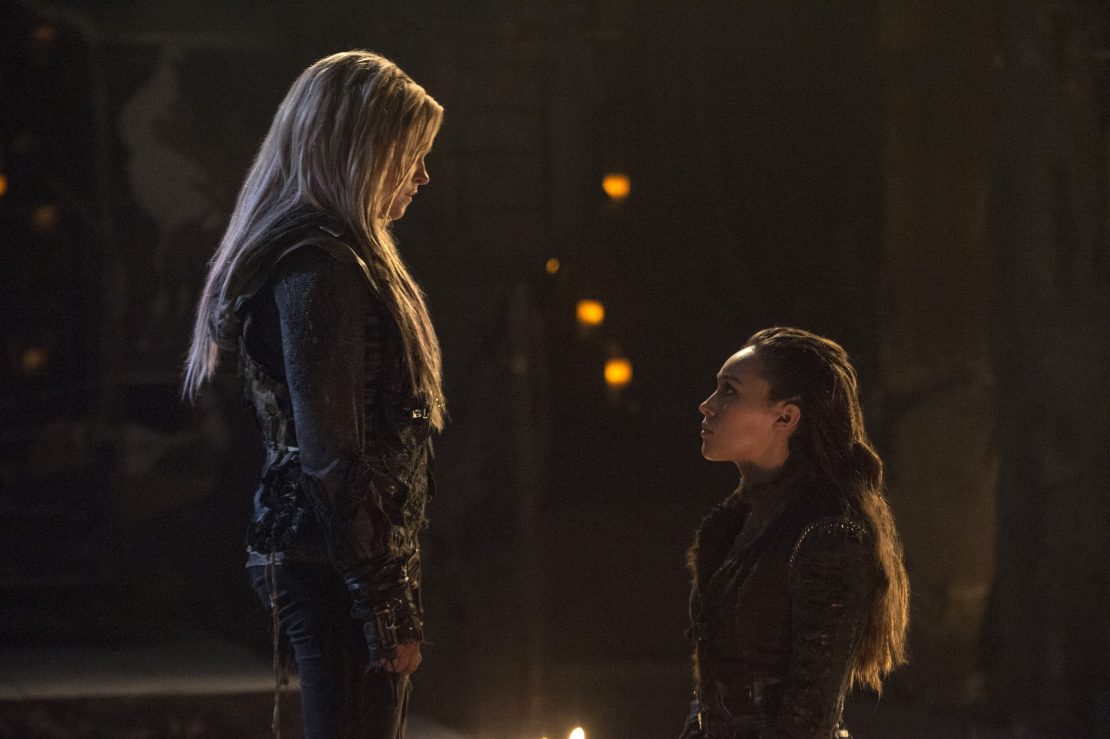
The way Lexa died in season three of The 100 was, in all aspects, horrible. The sequencing of scenes called to mind the exact way that Tara Maclay died in season six of Buffy the Vampire Slayer, way back in 2002. It also created a wave of media coverage criticizing the “Bury Your Gays” trope and pushed the ever-growing list of deaths of fictional women who love women to the forefront of pop culture consciousness.
In particular, showrunner Jason Rothenberg was condemned for giving hope to young LGBT women everywhere by presenting a highly visible WLW relationship and then ripping it from their hands. Although the actress who played Lexa, Alycia Debnam-Carey, had to leave the show in some permanent way for the sake of her other roles, killing her off surely could have been avoided.
If she had to die, she definitely didn’t have to die right after having sex with Clarke Griffin. Giving LGBT characters a moment of happiness before slaughtering them is a trend that needs to end, immediately. It’s gone on for too long.
Setting all of that aside, the actual series of events leading up to Lexa’s death is also problematic, for entirely different reasons. Although Lexa’s death and the events preceding it were not okay, it also needs to be pointed out that the relationship between Lexa and Clarke really isn’t good WLW representation.
Their whole relationship reads like a throwback to the Pocahontas myth. Like the Disney version, but sexualized. Pocahontas falls for John Smith and protects him from the “savages” in her village; Lexa falls for Clarke Griffin and protects her from the “savages” in her coalition.
Clarke Griffin’s magical vagina tames the savage Heda, so the Sky People aren’t slaughtered despite repeated acts of violence against the grounders.
Uh… yikes.
When the audience is first introduced to Commander Lexa in season two, it’s after she’s put out a bounty on all Sky People (referred to as “Skaicru”) after Finn massacres a grounder village. Jaha and Kane are captured and held in a cell until one of them kills the other — they’re told that then and only then will the commander come to speak with them. Lexa disguises herself as a common grounder and stays in the cell with them, listening to them talk. They refuse to kill each other, which makes them interesting to her.

Later, when she reveals who she is, she doesn’t deal well with the adults. Her respect is for Clarke and Clarke alone. When Clarke gets involved in the negotiations, Lexa rescinds the bounty on Sky People and says she will settle for Finn’s death as vengeance for the massacred village. It would seem that Lexa respects Clarke as a fellow commander, which is interesting given how violently Lexa treats everyone else who disagrees with her.
Here’s what we learn about Lexa from that point: she was once Anya’s second, but stopped her training when she was called to the conclave in Polis following the death of the last commander. As a nightblood, it was Lexa’s calling to participate in the conclave. After Luna fled, Lexa won the conclave, took the flame and ascended to the role of commander. Later, she fell in love with Costia, another grounder, before Costia was captured by the Ice Nation, tortured and then beheaded in an attempt for Queen Nia to learn Lexa’s secrets.
Needless to say, Lexa’s history with romance is tragic. She tells Clarke in season two that love is weakness, not long before kissing her. At the end of the season, Lexa breaks an alliance with Clarke and the Sky People in order to save her own people, which condemns Clarke’s people to die inside Mt. Weather. Whatever respect Lexa has for Clarke — whatever feelings — don’t trump her need to save and protect the grounders, regardless of any alliance.
When Clarke and Lexa reunite in season three, Clarke is a political prisoner, captured by Roan who seeks to kill her and gain her powers as Wanheda (“Commander of Death”). Clarke earns that title from the grounders by slaughtering anyone who gets in the way of her trying to protect the Sky People.
In that way, she and Lexa are very similar: when there’s a threat to their people, they sacrifice anyone in order to eliminate that threat.
But when it comes to each other, that’s complicated. Clarke’s feelings for Lexa make her try to change how Lexa behaves and thinks; Lexa’s feelings for Clarke make her soft, which allows Clarke to succeed.
“Blood must have blood” is the battle cry used by Lexa and the coalition. It’s a cry for vengeance as much as a means of intimidation: if anyone acts against the grounders in the coalition, they’re punished with torture and then death. The same goes for anyone in the actual coalition who steps out of line. “Blood must have blood” gives Lexa and her warriors a background on which to stage acts of violence which supposedly protect the coalition from violent outsiders as well as rebels within.
It’s this battle cry that’s used against Jaha and Kane when they’re captured in season two, after the bounty has been issued on the Sky People. It’s this battle cry that’s used against Finn after he massacres a village. It’s this battle cry that’s used against Raven when Indra tortures her because Lexa thinks Clarke and friends tried to poison her.

“Blood must have blood” is a way of life for Lexa and the coalition… until Clarke. Once the Sky People are invited into the coalition as the thirteenth clan, Clarke opts against going back to Arkadia (after months of wandering the woods by herself) and stays in Polis as an ambassador for her people.
It’s during this stay in Polis, with Lexa, completely separated from her friends, family, and everyone else she knows, that Clarke convinces Lexa “blood must not have blood.” And it works, because Lexa trusts Clarke, but also because Lexa is into Clarke. She wants Clarke to trust her again after her betrayal at Mt. Weather in season two.
“Love is weakness,” after all. Falling for Clarke completely changes how Lexa rules, which makes Clarke a danger to the stability of the coalition and prompts Titus to try to kill her. That’s how Lexa dies: from a bullet meant for Clarke, who convinced Lexa to change her people’s ways in order to save her people from slaughter.
So while Clarke has to be completely separated from her people in order to truly fall for Lexa, Lexa just has to have Clarke around in order to want to change. Seeing similarities to the Pocahontas myth yet?
Here’s what I mean: John Smith seeks out Pocahontas and “tames” her savage ways by falling in love with her. Their relationship assimilates her people to colonial society. Similarly, Clarke “tames” Lexa by convincing her to replace retribution (“blood must have blood”) with diplomacy (“blood must not have blood”), a Skaicru ethos. This assimilates Lexa into this aspect of Skaicru culture via her romance with Clarke; as the commander of the coalition, Lexa makes this new ethos law. Thereby, Clarke removes and erases grounder ways of knowing and being, which is an act of settler colonialism.
If Kane had stayed in Polis instead, after taking the brand on his arm to mark Skaicru as the thirteenth clan in the coalition, the course of season three would have been very different. Kane’s approach to diplomacy is inclusion rather than exclusion; he shows that by taking the brand and trying to meld the Sky People’s edicts with the grounders’. Had he stayed as the ambassador in Polis, the specific type of settler colonialist “Clexa” perpetuates could have been avoided. If Lexa had to die, it wouldn’t have invoked Tara Maclay or Pocahontas at all.
Unfortunately, season three didn’t go that way. Rather than allowing Kane to work with the coalition, the writers had Clarke force her people’s ways onto the grounders. Clarke has a larger pool of people to assimilate than John Smith, but she does it through Lexa — just like John Smith assimilates Pocahontas’ village through her. This is settler colonialism at its most romanticized.
As disturbing as it is that Jason Rothenberg took so much credit for portraying a canon WLW relationship on The 100 and then totally missed the mark in his weeks-late apology for killing Lexa off, it’s equally disturbing that the relationship between Clarke and Lexa (“Clexa”) is a direct portrayal of settler colonialism. Repeating this violence against indigenous cultures and playing it as “romance” is horrifying, considering the ways in which settler colonialism is still perpetuated today.
The entire relationship between the Sky People and the grounders is reminiscent of the genocide enacted upon Native Americans by European settlers. Twisting the Pocahontas myth into WLW representation to hide how genuinely gross that is doesn’t help Rothenberg. It only harms him further.




3 thoughts on “100 Thoughts On The 100: Clarke Griffin’s Magical Savage-Taming Vagina”